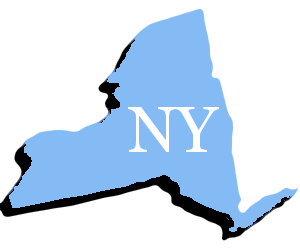Dialysis Technician Training in New York
There are no regulations that specifically address dialysis technician training and certification requirements in the state of New York; however, the state has included language in its nursing regulations that require licensed practical nurses to work under the supervision of a registered nurse when providing care to dialysis patients. An individual planning to work as a technician in New York may want to assume that similar requirements would apply to dialysis technicians.
According to New York State Education Law, all LPNs must:
- Work under the supervision of a registered professional nurse
- Complete proper training and demonstrate competence
- Pass a written examination
Traditionally, the costs associated with dialysis treatment were the exclusive responsibility of the patient. Since dialysis is a very expensive procedure, most patients were unable to pay for the medical care they needed. In addition, most health insurance companies were unwilling to offer dialysis policies to individuals who were at high risk of end stage renal failure.
 Many hospitals across the United States had developed dialysis boards that were responsible for determining which patients would receive treatment based on age and projected future contribution to society. This approach caused many problems in healthcare and led to the government takeover of dialysis reimbursement. Today, the Centers for Medicare and Medicaid Services (CMS) cover approximately 80% of all the expense incurred from dialysis treatment.
Many hospitals across the United States had developed dialysis boards that were responsible for determining which patients would receive treatment based on age and projected future contribution to society. This approach caused many problems in healthcare and led to the government takeover of dialysis reimbursement. Today, the Centers for Medicare and Medicaid Services (CMS) cover approximately 80% of all the expense incurred from dialysis treatment.
CMS regulations 494.140 (e)(1-4) state that the patient care technician training and certification requirements must meet these guidelines:
- Meet all state requirements for:
- Education
- Training
- Credentialing
- Competency
- Standards of practice
- Certification
- Licensure
- Have a High School Diploma or GED
- Complete an approved program that includes the following:
- Principles of dialysis
- Care of patients with kidney failure
- Possible complications of dialysis
- Water treatment and dialysate preparation
- Infection control
- Safety
- Dialyzer reprocessing
- Certification by a State or National Program within 18 months of employment
In many states, dialysis facilities are allowed to design and administer their own dialysis technician training curriculum. While training protocols are relatively standardized among large national dialysis companies, many of the independent dialysis companies may modify the training process. As long as a training program includes common standards for the delivery of dialysis, most state and federal agencies will continue to reimburse facilities. Individuals who plan to pursue the dialysis technician career field should at least understand the types of certification options that are available. Most technicians will work for 6 – 18 months prior to completing a certification exam. This gives them time to acquire the knowledge and skills they will need in order to perform well.
The three most common technician certification organizations include:
- The Nephrology Nursing Certification Commission (NNCC)
- Certified Clinical Hemodialysis Technician (CCHT) Exam
- The Board of Nephrology Examiners Nursing and Technology (BONENT)
- Certified Hemodialysis Technician (CHT) Exam
- The National Nephrology Certification Organization, Inc. (NNCO)
- Certified in Clinical Nephrology Technology (CCNT) Exam
- Certified in Biomedical Nephrology Technology (CBNT) Exam
The quality of dialysis treatment across the United States has been monitored by the government for many years. Back in 1978, Congress developed 18 non-profit networks that were tasked with keeping watch over dialysis clinics in their jurisdiction. The primary role of these networks is to retrieve and analyze statistical information, promote rehabilitation, and serve as an informational resource for patients and facility personnel. New York is the sole member of Network 2.
New York Dialysis Technician Training and Career Links
- Adirondack Medical Center
- Albany Medical Center
- Arnot Health Center
- Atlantic Dialysis
- Bassett Healthcare
- Bronx Center for Rehabilitation and Healthcare
- Brookdale Hospital
- Brookhaven Memorial Hospital
- Brooklyn Hospital Center
- Brooks Hospital
- Claxton-Hepburn Medical Center
- Columbia-Greene Dialysis
- CVPH Medical Center
- Davita
- Dialysis Clinic, Inc.
- Eastern Niagara Health Systems
- Elmhurst Memorial Healthcare
- Erie County Medical Center
- Faxton St. Luke’s Healthcare
- Finger Lakes Health
- Flushing Manor Dialysis Center
- Fresenius Medical Care
- Glen Falls Hospital
- Good Samaritan Hospital
- Harlem Hospital Center
- Hastings Hemodialysis
- Huntington Hospital
- Innovative Health Services
- Island Nursing and Rehab
- Jewish Home Lifecare
- Kings County Hospital
- Kings Harbor Multicare
- Kingsbrook Jewish Medical Center
- Lincoln Medical Center
- Long Beach Medical Center
- Lower Manhattan Dialysis Center
- Massena Memorial Hospital
- Montefiore Medical Center
- Mount Sinai Hospital
- Nassau Hospital
- Nassau University Medical Center
- Neomy Dialysis Center
- New York Presbyterian Hospital
- Niagara Health System
- Noyes Health
- Olean General Hospital
- Queens Dialysis Center
- Renal Research Institute
- Rochester General Health System
- Rogosin Institute
- Rubin Dialysis
- Southampton Hospital
- St. Barnabas Hospital
- St. Catherine of Siena
- St. James Mercy Hospital
- St. Joseph’s Hospital
- Terrence Cardinal Cooke Health Center
- The Children’s Hospital of Buffalo
- UHS
- Unity Health System
- US Renal Care
- Weiss Renal Center
- Winthrop University Hospital Center
- WCA Hospital
State Contact Information
 Phone: (518) 474-3817 ext 120
Phone: (518) 474-3817 ext 120
Fax: (518) 474-3706
Email: nursebd@mail.nysed.gov
89 Washington Ave Albany, NY 12234-1000
Web Site: New York Board of Nursing
National Network: Network 2
